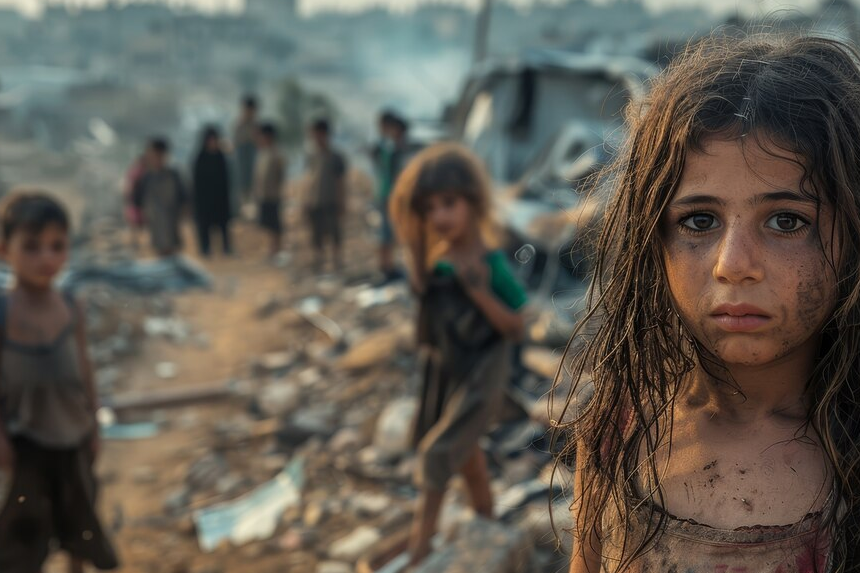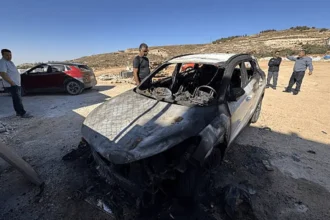Residents in Jenin’s refugee camp recount the harrowing moments of a military siege, cut off from the outside world as explosions and gunfire disrupt daily life.
Is Communication Being Severed?
The messages trickle through on the Israeli phone network—snippets of life from Jenin’s refugee camp. Residents describe a harrowing existence where fear reigns, and information is scarce.
“I don’t dare go on the roof, in case I’m shot,” one resident confides, speaking anonymously. The streets, he explains, are eerily empty. People stay indoors, afraid to venture outside.
“It’s mostly old people and children here,” he says. “The young people left before the army arrived. It’s bad luck for those who can’t get out.”
As attention turns to Jenin, those within the camp live in a near-complete news blackout. The Palestinian phone network was down for much of the day—cut by the Israeli military operation, according to the local telecoms company. Despite the chaos, the resident says his family is fortunate to still have water and electricity, and a small shop nearby has managed to stay open, selling essential supplies under the constant buzz of military drones.
While he speaks, scattered gunshots echo across the rooftops, seemingly coming from within the camp.
“Yes, I heard them too,” he confirms. “The sound of the drones has increased.”
What's Behind the Unsettling Quiet?
An armored bulldozer rumbles toward one of the camp’s main entrances, where the sun beats down a deserted road. The night before, explosions and gunfire erupted from the narrow alleyways, shattering the silence and disrupting sleep. Yet, the man remarks on the unsettling calm that has since followed.
“It’s abnormally quiet,” he says, noting that there have been no signs of house-to-house searches in his neighborhood nor any visible fighters from the camp.
The quiet is deceptive, as the Israeli army has completely sealed off the camp since it arrived before dawn on Wednesday. This is part of a broader, coordinated operation targeting several centers in the occupied West Bank. Jenin camp, a base for armed Palestinian fighters, also houses countless unarmed civilians. The camp has seen fierce gun battles in recent months as Israeli forces repeatedly raid the area, searching for militants.
Why do Military Forces surround Hospitals?
Military presence surrounds two of Jenin’s leading hospitals. Army vehicles are stationed at critical points, and ambulances approaching the hospitals must stop. Drivers reverse their vehicles as terse instructions blare from loudspeakers mounted on Israeli army Jeeps. In one scene, paramedics leave their ambulance to open the back doors, revealing the interior. Two female patients are ordered to exit and present themselves to the soldiers inside the Jeeps.
Nearby, Jenin’s commercial district is a ghost town—shuttered shops, empty streets, and abandoned goods. Cardboard boxes litter the road, and fruit left on carts begins to rot under thin cotton coverings. The sickly-sweet stench of decaying mangoes hangs in the air, starkly contrasting the usual hustle and bustle of the market.
How Are Residents Struggling to Survive?
Amid the devastation, a small grocery shop opens its doors in the afternoon, providing a lifeline for those who can reach it. One such individual is Thaeer Shana’at, who stocks up on food to deliver to families in Jenin’s eastern neighborhood. But getting the supplies where they are needed is a complex task.
“The whole of the eastern area—a population of about 20,000—is sealed off,” Thayer says. “Only ambulances can deliver food. If we go there, we get fired at. There are many areas where we can’t deliver people any food or drink.”
Thaeer’s own family is caught in the crossfire. His wife and baby remain in Jenin camp, unable to escape before the army arrives.
“They are scared to open the door,” he says. “A sniper is directly stationed in front of the house.”
The danger is all too familiar for Munir Garwan, a former municipal worker now waiting in line to buy food. Munir once belonged to the West Bank’s leading political party, Fatah, and spent six years in an Israeli jail for shooting at the army and being part of what is labeled a “hostile organization.”
Reflecting on the conflict, Munir says, “The occupation [Israel] claims it is trying to stop terrorism. But when the young men get killed, new ones take their place. They are getting nowhere like that.”
“We are not fighting to make someone victorious over the other,” he adds. “We are fighting for our rights.”
Is Communication Slowly Being Restored?
As night falls, the familiar sounds of explosions and gunfire return from the direction of the camp. The communication blackout that had stifled Jenin for hours begins to lift, and information about the ongoing military incursion starts circulating. Details emerge about those injured and killed, their names and stories trickling back into the camp.
Yet, as the news blackout fades, so does the hope of hearing good news. For the residents of Jenin, the end of silence brings only more tragedy.
“The news is the last thing people here want to hear,” says one resident.








